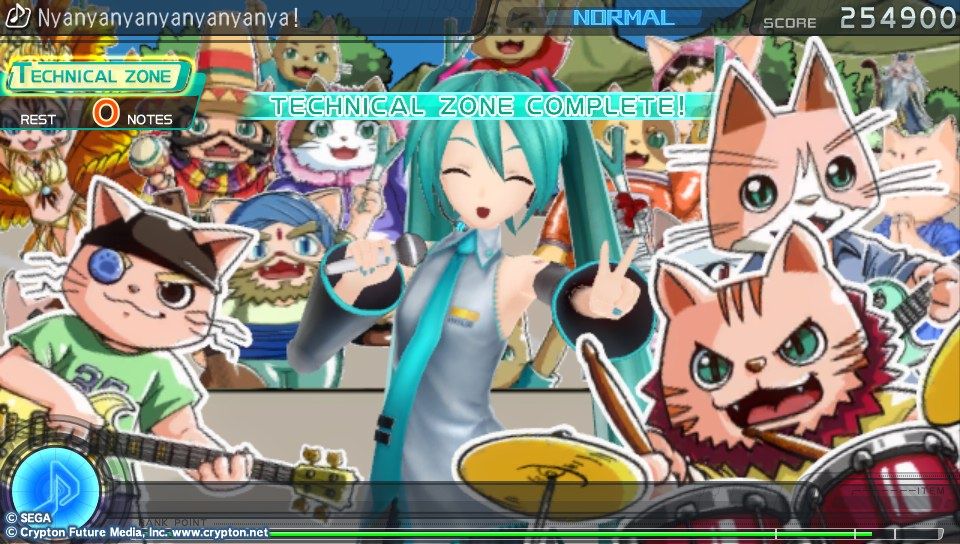
Gameplay in Project Diva is similar to other rhythm games; gray spheres appear on screen which are followed by trailing button icons (the four face buttons) where you then press the corresponding button when it is near or within the sphere. The button presses are timed to the song playing so that your input is consistently syncopated with the music, a staple of the series as this is handled extremely well for not only beats of the music but lyrics also. It is simple and accessible, but also bears a rapid change in button variety and speed per difficulty level. There are also Chance Times, which are brief segments where points are doubled (in this entry they also conclude with a "Swipe Star" (more on that below)).
The music selection is of the first radical changes, something which may have to do with the alleged lower interest from women for the series; these songs simply rock, and nearly all songs are of such extreme energy and pace that you'll rarely find yourself taking a breath between. While there are a few slower or more sentimental songs, mostly you will find the tracks bearing toward punk rock, electronic/club music, and straight rock n'roll, and they are each downright cool. There's a lot of diversity in each track's sound, but this is without doubt the most energized and demanding of Project Diva soundtracks, host to songs such as Sadistic Music Factory and the acclaimed Vocaloid track Black Rock Shooter. All tracks are selected carefully though, and you'll be hardpressed to find one you genuinely do not enjoy.
Project Diva f (PDf) holds the established gameplay of the series to a fine point, but it is the several, subtle additions that make this entry stand out; Player Immersion seems to have been on the mind of Sega here, and they nailed it. The addition of Technical Zones, areas where you have to hit a number of notes with only a "Fine" or "Cool" rating to achieve a 1.5 bonus, really enliven the gameplay element for each song. If you want to close the gap between a "Great" and "Excellent" rating (or to just keep yourself from failing), these technical zones are absolutely crucial, and cause each song to not only be played and listened to, but submerged into. All songs have at least one Technical Zone, and the longer ones have multiple.
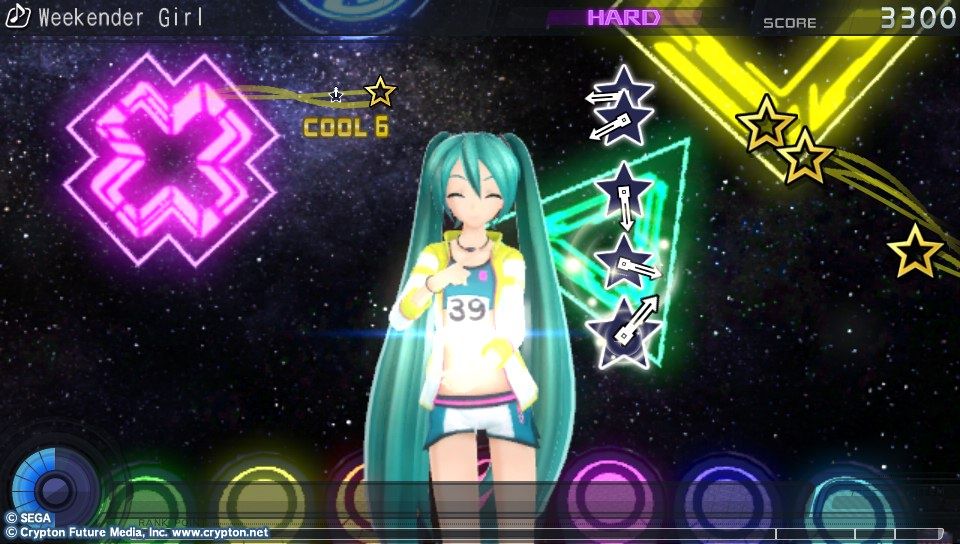
The most important addition though are the Swipe Stars. Swipe Stars act just like the buttons, but are inputted by swiping your finger across the screen. Fortunately these aren't just a utility of "gimmick" for the Vita's touchscreen, and are only used in sporadic brilliance throughout each song, particularly in opening segments, solos and closings, areas where swiping your finger goes alongside what is usually a singular instrument (keyboard, guitar, etc:). It feels completely natural, and best of all is the intelligence surrounding them; Project Diva f does not ignore that swiping requires you to take your hand from the buttons, and even on the hardest difficulty the Swipe Stars are never used in an improbable or hindering manner, always allowing enough time for you to re-adjust to the face buttons. Mostly Swipe Stars are used in areas of their own, but on harder difficulties become a part of combos, and still there is never a moment where the game ignores the handicap of taking your finger from the buttons. They're a terrific addition to the series as, like the Technical Zones, they keep the player focused on gameplay while holding a unique reward of their own; it feels good to nail an 10 streak swipe.
As for the Vita's dominating power, PDf doesn't skimp; all songs are accompanied by simply outstanding music videos which really take the series to a whole new level. Whether Miku is driving a Hoverbike within a Cybernetic City, smashing guitar jams in a burning down building or just doing a standard performance before a planet-sized crowd, everything is simply beautiful. All animations, all scenery; everything is just delightful and crisp, and this new potential for detail and variety really explores the scope of identity for the Project Diva experience. It's wild, and at times I even found myself ignoring buttons just to watch the music video. Fortunately completing a song unlocks the option to listen to and view it without having to do inputs, so you don't have to cripple your score over it.
I really can't express how stellar PDf's graphics and content are; it was genuinely saddening to know I can only choose so few from my tons of screen shots for this review.
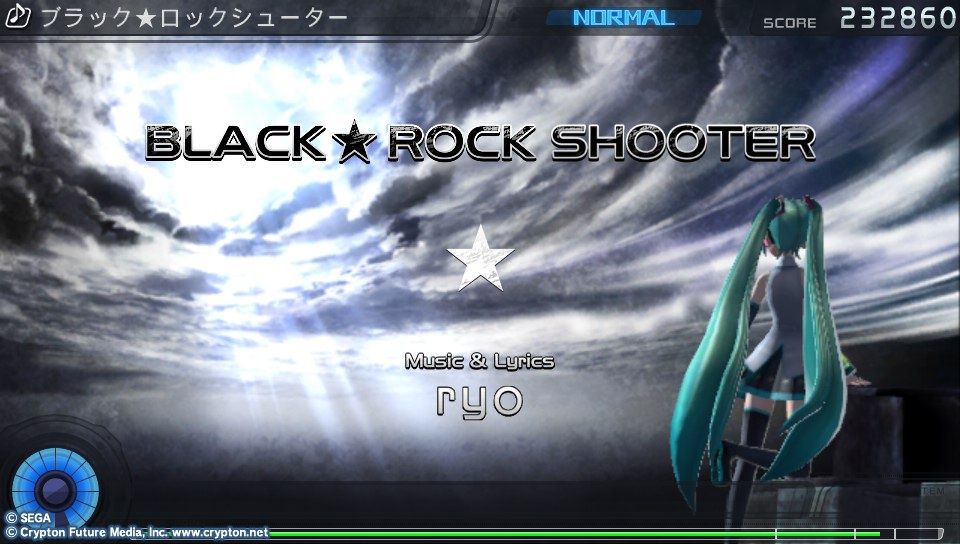
PDf also retains the usual outside of the main gameplay, with a few nice additions; Shop, which is the in-game store where you can purchase Modules (Outfits) for the full cast of six characters, items to assist you if you're having trouble with the songs/going for High Scores, and decorations for the Diva Room (a place you can just watch Miku do whatever she wants; you just watch). There is also the inclusion of items for individual segments that go on over Modules (Back items , Hair/Face items, Eye pieces, and Neck Items); these tend to be more towards the quirky side of Diva, and when combined can make some seriously bizarre/hilarious "Divas." Edit Mode is also still here, which allows you to customize and make your own tunes using the included songs (But you're going to need a considerable knowledge of Japanese to really utilize this); you can post your own tracks online as well as download others also. Ranking and Awards are kept under a tidy section where you view in-game awards, make your own Diva profile, and see how much you've done in the main game.
The new option is the AR Mode; this works by either using the included AR Marker which has Miku dancing to a song of your choosing wherever you place it, or taking a still photograph of Miku. It's a nice addition riddled with some of the most unique, adoring or sick possibilities that any person could think for silly lil' Miku, but it's nothing mind-blowing or necessary.
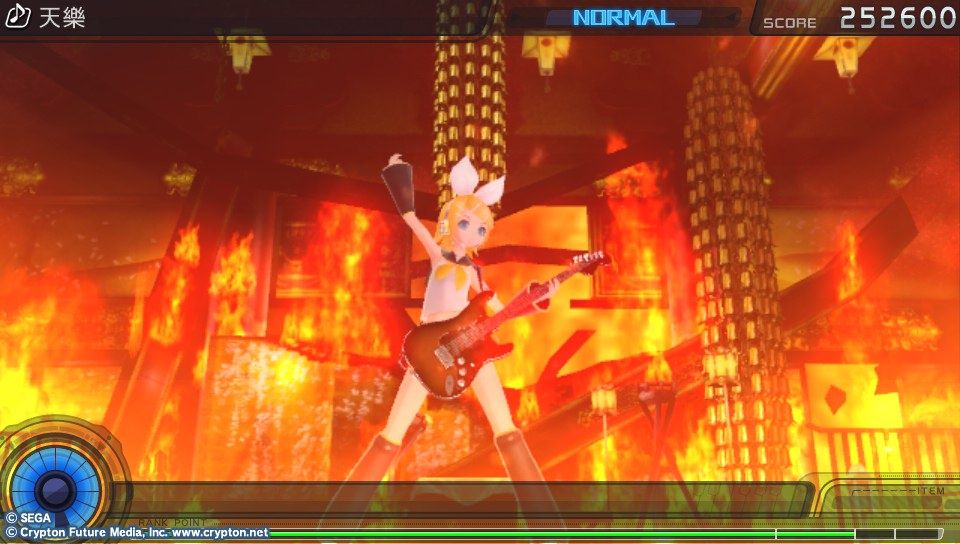
Project Diva f isn't completely without flaws though; On very few occasions did I find the background music video to blend alongside the button inputs causing me to miss or be distracted. Also, you still don't have the option to begin the game on either Hard or Extreme difficulty; for series' regulars, this is a bit annoying, as once you obtain the skill to handle these difficulties playing the game on Normal just doesn't bear the same immersion.
Project Diva f is certainly the most complete entry for the series to date, and while it does nothing to break the formula (a good thing, as it rocks), the carefully selected additions create an entirely unique perspective for the gameplay. And, so long as you don't have an utter distaste for the Japanese lyrics, then you've no reason to doubt Project Diva f; this is a must-have Vita title, and arguably the best for the system yet.
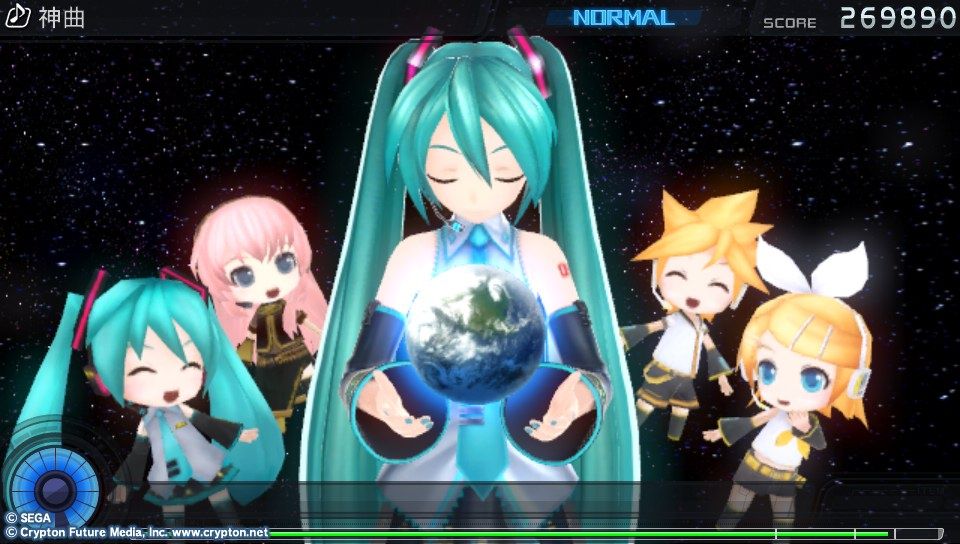
Language Barrier
Project Diva f has almost zero Language Barrier. The main menu is accompanied with helpful little icons like a shopping basket for the store or a house for Diva Home, and playing the game is as easy as clicking the O button twice. There are no secrets to playing Diva other than just beating a song and unlocking the next, and there's genuinely no "patience" required to just chowing right down into it.
That said, the Edit Mode and Items are going to be a shot-in-the-dark if you don't know Japanese. While the items are okay to pass (they disable you from either really clearing the song or keeping your score), losing the Edit Mode is kind of a bummer. Still, it's the core game of Project Diva f, which is 32 songs just over 3 hours total, alongside the two elevated difficulty settings besides Easy and Normal. where the series really shines.
If you have zero knowledge of Japanese, than this is the borderline perfect import.
No comments:
Post a Comment